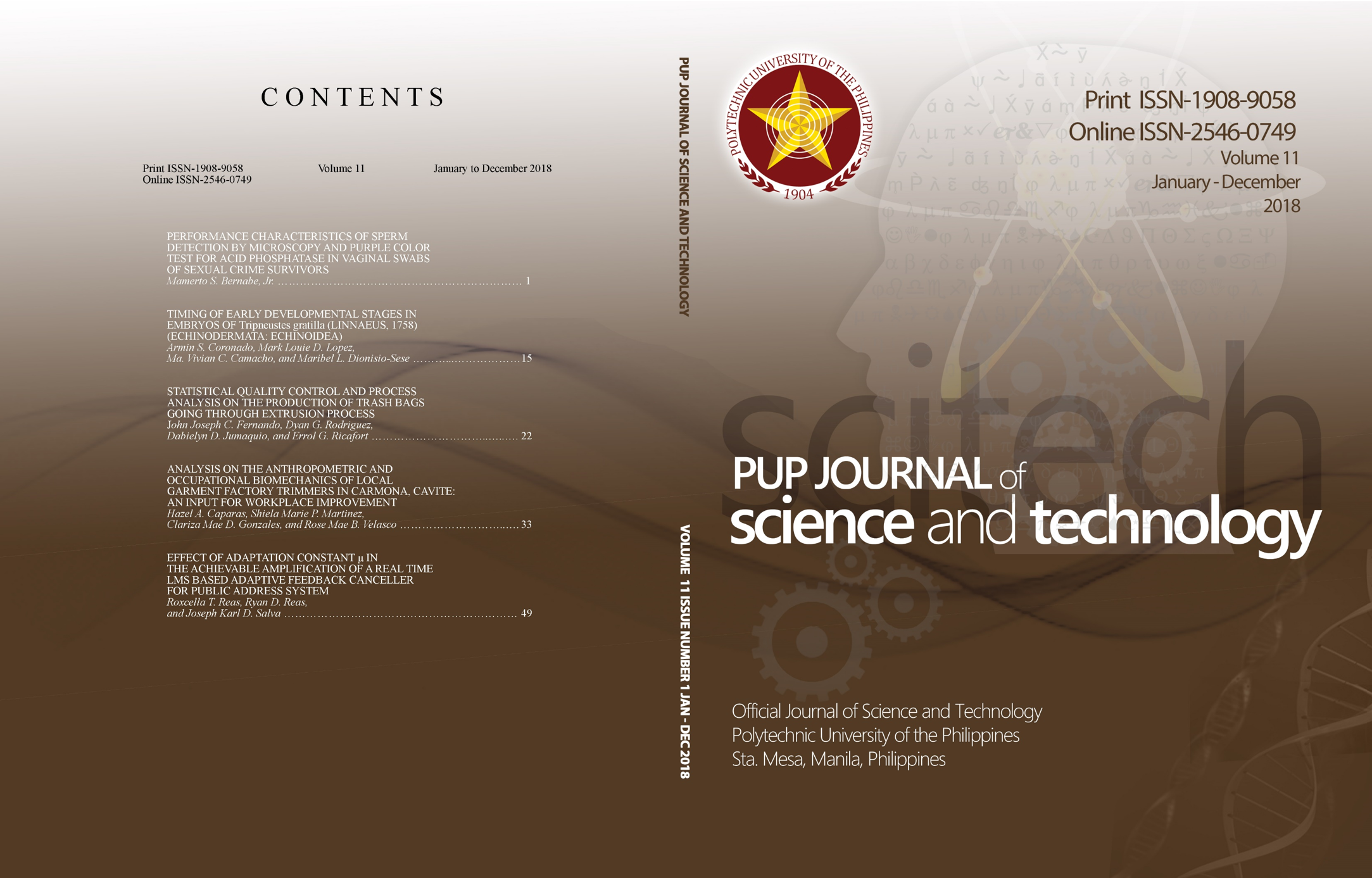Effect Of Adaptation Constant Μ In The Achievable Amplification Of A Real Time Lms Based Adaptive Feedback Canceller For Public Address System
DOI:
https://doi.org/10.70922/g74fx405Keywords:
acoustic feedback control, acoustic feedback canceller, howling, public address, adaptive filter, least mean square, adaptation constantAbstract
This study considers the problem experienced with public address system in an area constrained environment. In an environment wherein public address system is used to address the general public, acoustic feedback occurs unpredictably which significantly degrades the acoustic quality of the information signal. An adaptive filter is then presented, with the objective to reduce the effect of acoustic feedback of the public address system that might occur at any point within the area. The system covers a 20th order multi-tapped finite impulse response (FIR) adaptive filter that is implemented in field programmable gate array (FPGA). The performance of the adaptive filter with least mean square (LMS) adaptive algorithm was presented and the effects of the adaptation constant μ were investigated. The system was evaluated with a prepositioned speaker and microphone to which an acoustic feedback would occur by slowly increasing the gain of the audio power amplifier. An acoustic signal was also applied to a microphone as part of the evaluation. During an evaluation, the acoustic activity of the environment was observed by a spectrum analyzer and spectrograph. Results show that with large μ, the adaptive filter was able to quickly reduce the howling signal before the system exhibit an unstable behavior. However, results also show that the magnitude of the output information signal of the public address system with large μ is lesser compared to a smaller μ of the adaptive filter. This shows that the adaptation constant μ does not only eliminate the acoustic feedback but also reduces the amplification of the public address system with acoustic feedback controller.
Downloads
References
Berdahl, E., Widrow, B., & Flores, A. E. (2005). Acoustic Feedback Cancellation For Public Address Systems. Stanford University, California.
Bispo, B. C. & Freitas, D. (2015). On the use of cepstral analysis in acoustic feedback cancellation. Digital Signal Processing, 44, 88-101.
Bustamante, D., Worrall, T., & Williamson, M. (1989). Measurement of adaptive suppression of acoustic feedback in hearing aids. IEEE International Conference on Acoustics, Speech, and Signal Processing. Glasgow, UK: IEEE. doi:10.1109/ICASSP.1989.266855
Chi, H., Gao, S., Soli, S., & Alwan, A. (2003). Band-limited Feedback Cancellation with a Modified Filtered-X LMS for Hearing Aids. Journal on Speech Communication, 39(1-2), 147-161. doi:10.1016/S0167-6393(02)00064-X filters.
Elliott, S. J. & Nelson, P. A. (1989). Multiple-point equalization in a room using adaptive digital J Audio Eng Soc, 37(11), 899-907. Retrieved from http://www.aes.org/e-lib/browse.cfm?elib=6063
Ge, S. S. & Zhang, J. (2003). Neural Networks Control of Nonaffine Nonlinear Systems With Zero Dynamics By State and Output Feedback. IEEE Transactions on Neural Networks, 4(4), 900-918. doi:10.1109/TNN.2003.813823
Gil-Cacho, P., van Waterschoot, P., Moonen, M., & Jensen, S. H. (2009). Regularized adaptive notch filtesr for acoustic howling suppression. 17th European Signal Processing Conf. (EUSIPCO 2009). Glasgow, Scotland: IEEE.
Gou, M. (2012). Analysis, Design, and Evaluation of Acoustic Feedback Cancellation Systems for Hearing Aids. PhD Dissertation, Aalborg University, Denmark.
Ma, G., Gran, F., Jacobsen, F., & Agerkvist, F. T. (2011). Adaptive Feedback Cancellation with Band-Limited LPC Vocoder in Digital Hearing Aids. IEEE Transaction on Audio, Speech and Language Processing, 19(4), 677-687. doi:10.1109/TASL.2010.2057245
Miyoshi, M. & Kaneda, Y. (1988). Inverse filtering of room acoustics. IEEE Transaction on Acoustic Speech Signal Processing, 36(2), 145-152. doi:10.1109/29.1509
Ortega, A., Lleida, E., & Masgrau, E. (2005). Speech reinforcement system for car cabin communications. IEEE Transaction on Speech and Audio Processing, 13(5).
Rotaru, M., Stanciu, C., Ciochina, S., Albu, F., & Coanda, H. (2013). An FPGA Implementation of Prediction Error Method for Adaptive Feedback Cancellation Using Xilinx System Generator. International Conference on Adaptive and SelfAdaptive Systems and Application. Valencia, Spain.
Salva, J. K. (2007). Design and Implementation of a Computer Based Module on Active Noise Control in a Duct Using an Adaptive Filter. MEng Thesis, University of San Carlos, Cebu City.
Sarris, J. C., Jacobsen, F., & Cambourakis, G. E. (2004). Sound equalization in a large region of a rectangular enclosure. The Journal of the Acoustical Society of America, 116(6), 271–3274. doi:10.1121/1.1819500
Siqueira, M. G. & Alwan, A. A. (2000). Steady State Analysis of Continuous Adaptation in Acoustic Feedback Reduction System For Hearing Aids. IEEE Transactions on Speech and Audio Processing, VIII(4), 443-453.
Tendero-Reas, R. & Reas, R. (2016). Study of an adaptive servo control using adaptive filtering scheme. 2016 2nd International Conference on Control, Automation and Robotics (ICCAR). Hong Kong: IEEE. doi:10.1109/ICCAR.2016.7486717
Treichler, J. R., Johnson, R. C., & Larimore, M. G. (2001). Theory and Design of Adaptive Filters (First ed.). New Jersey, United States of America: Prentice Hall Inc. Ushiyama, S., Hirai, T., Tohyama, M., & Shimizu, Y. (1994). Howling suppression by smoothing the open-loop transfer function. IEICE Tech. Rep., 94.
Downloads
Published
Data Availability Statement
You may access the file from https://apps.pup.edu.ph/ojs/app/journal/PUPJST/issues
Issue
Section
License
Copyright (c) 2021 PUP Journal of Science and Technology

This work is licensed under a Creative Commons Attribution-NonCommercial 4.0 International License.







